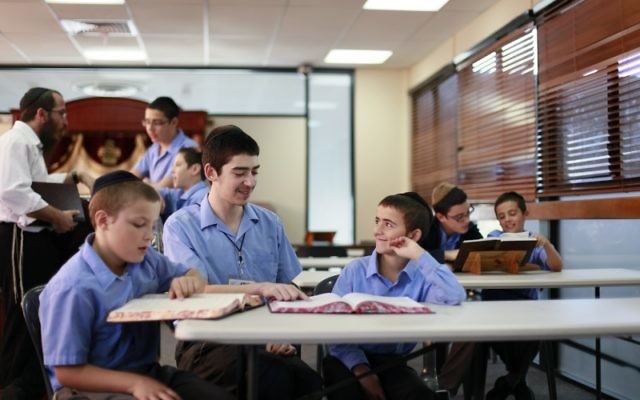Jewish schools too expensive? Not any more
IF the prospect of exorbitant fees is deterring you from sending your kids to a Jewish school, think again. That’s the message from Melbourne’s Yeshivah-Beth Rivkah (YBR) Colleges which this week launched what they hailed as a “revolutionary approach” to school fees “making Jewish education an affordable and sustained reality”.
IF the prospect of exorbitant fees is deterring you from sending your kids to a Jewish school, think again. That’s the message from Melbourne’s Yeshivah-Beth Rivkah (YBR) Colleges which this week launched what they hailed as a “revolutionary approach” to school fees “making Jewish education an affordable and sustained reality”.
Heralded as a “daring assault on currently accepted norms”, which “will change the face of Jewish education as we know it”, YBR CAPS (Creating Access Promoting Success) will determine the maximum fee to be paid according to a family’s income and assets, with that fee remaining unchanged for at least six years.
But it doesn’t end there. That fee covers all of your children, so whether you have one child at the school or 10, the same single fee applies.
Ultimately, parents will pay the full fee or the capped fee, depending which is cheaper.
Available to families whose combined income is below $350,000, the maximum amount parents will pay under CAPS, regardless of the number of children going to the school, will be a percentage of their income, capped at 18 per cent for the highest earners and at eight per cent for the lowest earners.
Income and assets aside, specific circumstances relating to individual families will also be taken into consideration.
With studies both in Australia and overseas showing a correlation between Jewish education and sense of Jewish identity and affiliation, YBR hope that the new system will reverse the trend of parents sending their kids to government schools and the subsequent impact that will have on Jewish continuity.
With the fee payable determined via an online calculator, it’s also claimed CAPS will remove what some perceive as the stigma attached to asking for fee relief, and will be more dignified and transparent.
Highlighting the financial benefits of the system, YBR notes that under current fees, a family with an income of $130,000 with one child in prep, one in grade 3 and one in year 7, could face a bill of around $44,000 per annum.
But under CAPS, they’d pay just $13,000 per annum.
It would remain the same if they sent more children to the school and would only change if their income went into a higher or lower bracket.
Writing in this week’s AJN YBR principal Rabbi Yehoshua Smukler says having a fixed fee means parents “can feel financially secure and plan for the future”.
Noting the ethos underlying YBR CAPS that “We believe Jewish education is a right that all Jewish children deserve,” Smukler writes, “We don’t believe in forcing parents to accumulate debt, nor should they greatly compromise their quality of life and make unreasonable sacrifices to provide their children with a Jewish education.
“We don’t believe parents should have to endure the humiliating and exposing process of asking for handouts and fee relief. All we ask is that parents make a fair contribution to fees according to their individual circumstances.”
According to YBR, the scheme is being funded through government grants allocated on a per capita basis, a cost effective school budget and donations from the community.
Reacting to YBR’s announcement of the CAPS scheme, other Jewish schools stressed subsidised fees were nothing new. Bialik principal Jeremy Stowe-Lindner told The AJN “Affordability is at the forefront of our minds, which is why nearly a quarter of Bialik students are supported with means-tested fee assistance so that no Jewish child is denied an outstanding Jewish education.”
Leibler Yavneh principal Roy Steinman concurred. “Jewish day school affordability is an important issue. Leibler Yavneh College has a generous fee relief program that provides annual subsidies of $3 million in a disciplined and sensitive manner where each family’s circumstances are judged on its own merits. We firmly believe that no family should be denied a Jewish education because they cannot afford Jewish day school fees.”
Mount Scopus Memorial College principal Rabbi James Kennard said, “Mount Scopus is proud to be able to offer fee assistance to a significant number of families on a fair and transparent means-tested basis. We continuously strive to offer the best possible educational experience, according to our unique Scopus values, in a way that is as affordable and accessible for as many Jewish children as possible”.
JCA president Peter Philippsohn said the model has been discussed in Sydney in the past. “The big plus is that we know there are a lot of people entitled to fee assistance but they are too proud to ask,” Philippsohn said. “This particular model we only became aware of earlier this year and we are still looking at it. Anything to encourage more people to send their kids to Jewish schools is key to the future of our community.”
Emanuel president Grant McCorquodale echoed the thoughts of Philippsohn and said he is in constant conversation with the JCA to make sure the schools stay affordable and don’t become elitist. “If there are any ways to reduce the direct cost to parents then obviously we should look at them,” he said.
McCorquodale stressed that parents should not expect any sudden drop in fees overnight in Sydney because of the new YBR model.
Yeshiva receives $6500 more than Emanuel, per student, each year from the government. “Eighty per cent of the fixed costs to run a school is teacher salaries so it is not a cost that you can just evaporate without compromising quality,” McCorquodale said.
For more on YBR CAPS, visit www.ybrcaps.com.
ZEDDY LAWRENCE


comments